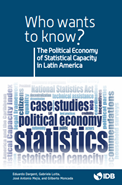Who wants to know?: The Political Economy of Statistical Capacity in Latin America
Date
May 2018
Why is there a disparity in the levels of technical and institutional capacity of national statistical offices (NSOs) in the Latin American and Caribbean region?
There is a consensus about the importance of having up-to-date and quality official statistics. The data from censuses, household surveys, and administrative records are an essential input for decision-making, and for the design, implementation, and evaluation of public policies in a country. However, this recognition of the value of statistics does not necessarily translate into greater support for the institutions responsible for their production.
To understand the disparity in the capacity of NSOs, the publication provides an innovative approach: it uses the theoretical framework of the study of State capacity, and it develops a methodological framework to compare the political economy factors that influence statistical capacity, through case studies in ten countries of the region: Argentina, Bolivia, Brazil, Colombia, Dominican Republic, Ecuador, El Salvador, Guatemala, Mexico, and Peru.
Additionally, the publication offers a series of recommendations to strengthen the capacity of NSOs in the region, which include the implementation of institutional reforms to modernize the legal frameworks that govern NSOs in order to grant them more autonomy and allow them to assume a coordinating role of the national statistical system; the greater use of administrative records; the promotion of a dialogue between the NSOs and the community of data users; the establishment of links with non-governmental and international actors; and adherence to international standards and best practices for the production and dissemination of official statistics.
There is a consensus about the importance of having up-to-date and quality official statistics. The data from censuses, household surveys, and administrative records are an essential input for decision-making, and for the design, implementation, and evaluation of public policies in a country. However, this recognition of the value of statistics does not necessarily translate into greater support for the institutions responsible for their production.
To understand the disparity in the capacity of NSOs, the publication provides an innovative approach: it uses the theoretical framework of the study of State capacity, and it develops a methodological framework to compare the political economy factors that influence statistical capacity, through case studies in ten countries of the region: Argentina, Bolivia, Brazil, Colombia, Dominican Republic, Ecuador, El Salvador, Guatemala, Mexico, and Peru.
Additionally, the publication offers a series of recommendations to strengthen the capacity of NSOs in the region, which include the implementation of institutional reforms to modernize the legal frameworks that govern NSOs in order to grant them more autonomy and allow them to assume a coordinating role of the national statistical system; the greater use of administrative records; the promotion of a dialogue between the NSOs and the community of data users; the establishment of links with non-governmental and international actors; and adherence to international standards and best practices for the production and dissemination of official statistics.




